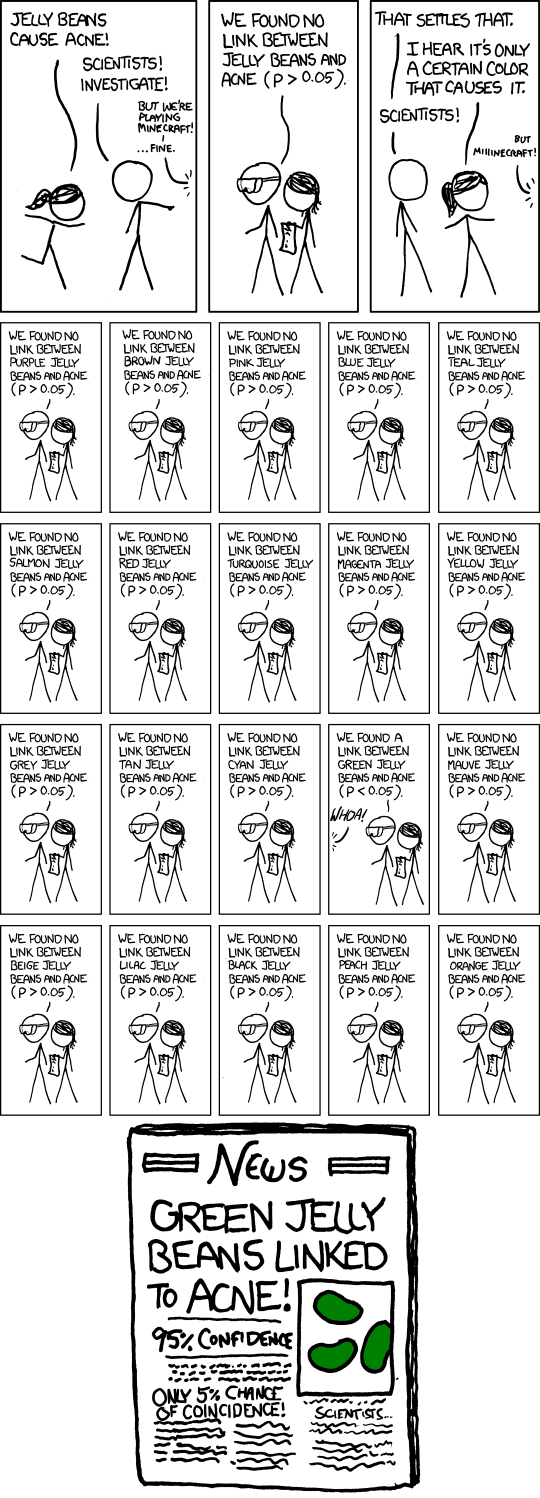3FEL9
Islander

So far so good.
If you would be so kind, please respond to all the questions.
Explain your p comics strip

So far so good.
If you would be so kind, please respond to all the questions.
Explain your p comics strip

So far so good.
If you would be so kind, please respond to all the questions.
I already did......not sure what jelly beans has to do with climatology.
But if you need me to I'll look up the definitions for the other two for you as I did for "p-hacking". Also I was taught to keep the percentage error/variance to below 0.5%......though at the beginning of the semester it was 1%.
Why don't we get back on topic now.

In my line of work, it more than often worked the other way around.. Thehypothesisreality did not concur with the hypothesis.
Solution. Deal with reality, fix the problem, write in the logbook, add new found knowledge to the theory..
Im not a scientist by any means
I am a scientist......but the adapt, improvise and overcome then write in the logbook is still used often enough in the field.
Many hazardous waste sites are sampled 4 times a year to monitor the water quality.....though the procedures used are the same, the getting it done is quite different in each season. But it still gives the information to reach a valid conclusion in the quarterly monitoring report.
I wondered about that once, if those highly hazardous site areas are tested in every season...What is the radius limit for testing soil and water tables?...
Some scientists think this next ice age we are entering will last a 100 years...
Carbon bounties (not taxes) could save us from the next Little Ice Age
One scientist who sees global warming receding as a threat — at least until the 2050s — is Valentina Zharkova at Northumbria University in the U.K., whose research indicates that Earth will soon enter a new Little Ice Age that will last decades.
Her findings, which were first presented to the Royal Astronomical Society’s National Astronomy Meeting in Wales in 2015, have since gathered support from hundreds of researchers.
In past little ice ages — “they keep repeating every 350-400 years because the Sun goes through this minimum activity,” Zharkova explains — crops failed and people suffered. She believes global warming may prevent the worst of a new Little Ice Age from occurring and that it may even bring a silver lining, at least temporarily.
Other scientists, such as Habibullo Abdussamatov, head of space research at the Russian Academy of Science’s Pulkovo Observatory in St. Petersburg and the author of the 2016 study, “The New Little Ice Age Has Started,” believes the Little Ice Age will last longer — about 100 years.
The reliability of Abdussamatov’s model — informed by Earth’s 18 earlier little ice ages over the past 7,500 years, six of them in the last thousand years — have been repeatedly affirmed by real events, such as irradiance measurements from the Sun.
The robustness of Abdussamatov’s model allowed him to predict in 2003 the advent of a new ice age by 2015. The models of all the scientists predicting warming, in contrast, have been proven by real events to be abject failures.
"Sigh".I already did......not sure what jelly beans has to do with climatology.
But if you need me to I'll look up the definitions for the other two for you as I did for "p-hacking". Also I was taught to keep the percentage error/variance to below 0.5%......though at the beginning of the semester it was 1%.
Why don't we get back on topic now.
Al Gore promulgates a 20 foot sea rise due to climate change yet still buys mansions by the sea.

Thanks.....I saw it the last page too.
"Sigh".
If you don't know the validity of the data we might as well be on the porch chewing our cud, drinking beer, and swapping lies.
In the XKCD cartoon what is the probability that if I try to reproduce the green jelly bean experiment that I will be successful? In other words is the result reproducible?
 .
.Maybe it will sink in for the pro climate changists .
Well we are in a warming trend.
That has ended recently it appears, now we are in a cooling trend and its going to get colder, there will probably still be some heat spikes but should diminish if the claims I posted above holds merit...
That has ended recently it appears, now we are in a cooling trend and its going to get colder, there will probably still be some heat spikes but should diminish if the claims I posted above holds merit...
